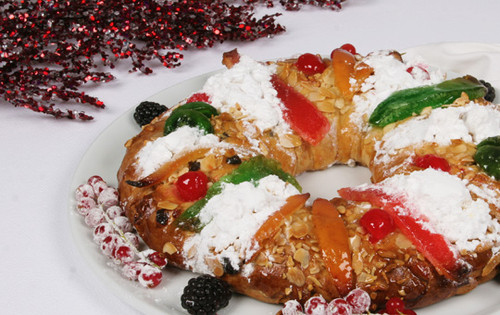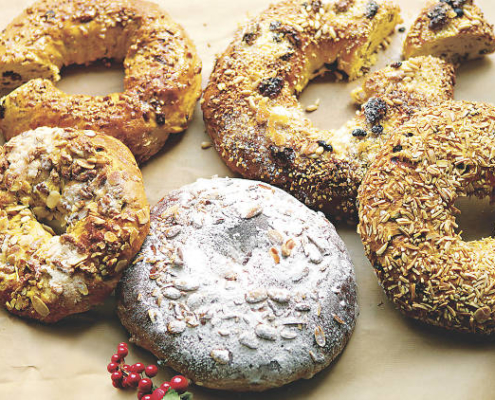Year-end traditions in Portugal
The cake of kings and queens from Christmas time onwards
Kings or queens, we like to enjoy the cake from Christmas onwards. Whereas elsewhere one waits for the 6th of January and the passage of the kings in the Christian tradition to taste it.
It is neither too much nor too late to enjoy it. A greedy sin that will be forgiven on Christmas Eve.
In Portugal it is eaten for about three weeks. It is a must on the festive tables.
To each his own royal cake.
The “bolo rei” is a brioche inspired by the French cake in vogue at the court of Louis XVI. It seems that the Confeteira Nacional in Lisbon adapted the Portuguese version around 1870.
Here, as in France, the cake of the Kings had to adapt to resist the establishment of the Republic and the French Revolution. And to the disappearance of the brioche, which was decidedly too connoted with the old regime.
Fortunately for the taste buds, the “bolo de rei” was rehabilitated.
The brioche on the Portuguese side is more compact than on the French version. A few dried fruits are introduced into the dough to respect the tradition of the “beggars”, each dried fruit symbolising a religious order.
Translated with www.DeepL.com/Translator (free version)
The Queens cake, a cake with a more modest appearance
With its dried fruit and pine nuts or fine slivers, the cake of the Queens cake has a more sober appearance. Very flavoured, its dried fruits give it a delicious crunchy caramel taste.
It often contains port or brandy. Its round shape is identical to that of the cake of kings. The cut gives it a rustic appearance due to the dried fruits and grapes.
It is not known why, but the tradition of the bean and the crown no longer exists in Portugal.
It persists in France . One can still hide under the table, distribute the shares blindly, and discover the happy owner of the bean.
With his crown on his head, he must choose his king or queen, and promise to offer the next cake.
Translated with www.DeepL.com/Translator (free version)
Delicious end-of-year traditions
The night of 31 December is called Passagem, the passage. The reference to Saint Sylvester is not used. And the night of 1 January only evokes New Year’s Day. It is therefore “Passagem”. And to make a success of this passage between two years and welcome the new year, tree traditions that cannot be ignored:
The 12 grapes
All Portuguese have in their hand or in their pocket a few grains for a good reason, 12 at least, like the twelve strokes of midnight. With each grain at each stroke of the clock or at the famous countdown… a wish. A wish for a successful New Year. And a very beautiful tradition that is rooted in the more general tradition of beggars.
Beggars
You can’t miss them for the festive season: these are the dried fruits that can be found everywhere in Portugal during the festive season. The shelves of grocery shops and supermarkets are overflowing with them. This corresponds to the clerical orders whose monks lived on charity. The winter dried fruit is therefore distributed: grapes, figs, hazelnuts and almonds or walnuts. Each of the fruits is supposed to correspond to one of the 4 mendicant orders: Franciscan, Carmelite, Dominican and Augustinian.
They are also abundant fruits in the countries around the Mediterranean, which are known to be well preserved. They are therefore invited for celebrations.
The blue lingerie
It is said that for the New Year to be beautiful, a new piece of lingerie should be worn on the night of 31 December. And in blue, because it is associated with joy and serenity. Blue being the favourite colour of Europeans. A festive colour. There is a variation, red lingerie. Don’t be surprised to see lingerie advertising placards with models wearing Santa Claus hats… The invitation to make a purchase is very present.
Be careful before asking your neighbour what colour panties she or he is wearing! But be aware that many people respect tradition.
A superstition for fun.
Happy Holidays!





